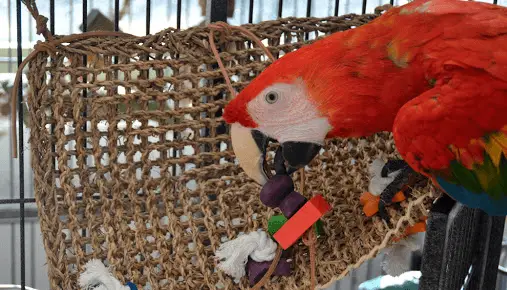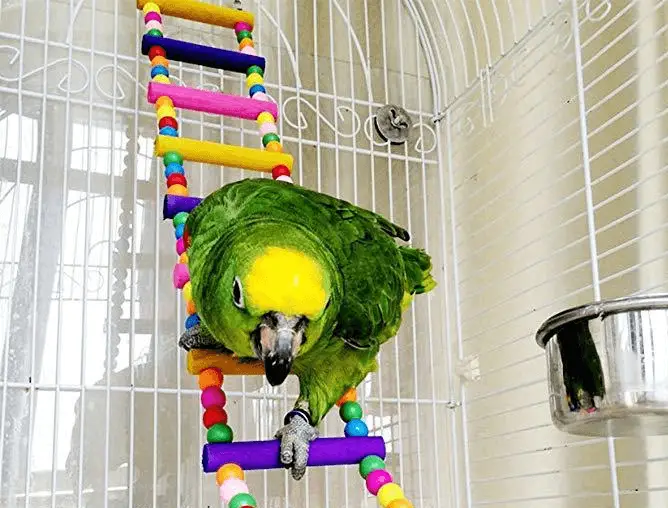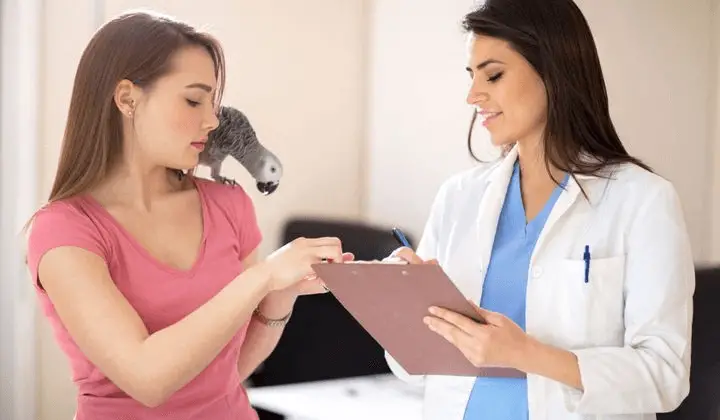Prevention of parrot health problems
A parrot is pretty and smart, and if you get it used to a healthy lifestyle, it will be healthier and able to develop mental skills.
Feed them a balanced diet and encourage them to participate in fun physical activities, which can help prevent some of the most common health problems in parrots in captivity, including obesity and cardiovascular disease.
As an owner, it is important to establish a structured education system. When training your bird or teaching it new tricks, you should:
Guide, supervise and respect the bird during training sessions;
Provide a safe, enjoyable and versatile training environment;
Provide activities and exercises that promote movement, dexterity and agility.

Parrot weight monitoring
To ensure the good health of your bird, weigh it daily, then you can easily observe the subtle fluctuations in its weight and spot health problems early on that would otherwise have gone hidden.
It is possible to combat the onset of obesity before it is too late by reassessing the parrot’s lifestyle and diet.
In addition, when guided on the scale, the parrot learns to recognize the important basic “up / down” command; it is therefore ideal to make this activity part of your daily routine. Each morning, you can ask your bird to “step down” from the night cage to put it on the perch for weighing before transferring it to the cage or day room.
Exploration activities
You can easily create innovative, stimulating and diverse exploration activities within your bird’s habitat.
The first few times, you need to mentor and guide the parrot in basic exploration activities. Hide pellets inside a destructible toy, and your parrot will learn how to reach its reward quickly.
Food for birds can gradually be hidden in their surroundings. It is excellent mental and physical exercise. However, make sure you take it step by step and slowly increase the difficulty level so that your bird understands how to access food at all times.

Parrot Climbing activities
To prevent your pet parrot from leading an inactive life, you need to motivate it daily to get the exercise it needs. Supervised flying sessions inside the home in a secure space are the most beneficial exercise for parrots, but parrots must also improve their agility and dexterity to engage in activities such as rock climbing.
Parrot climbing ropes
By equipping your companion’s home with an assortment of exercise-friendly climbing toys and ropes, you are giving your parrot the tools to stay in shape, in addition to encouraging mental exertion.
Parrots and small birds instinctively have fun climbing, exploring and playing when provided with ropes with swings and fodder toys. Watch them closely to make sure they have the strength, agility and confidence to perform these activities.
You should observe your bird’s level of stamina, skill and interest in each of the exercises performed. These measurements can also help identify underlying health problems. Also always make sure that the toys are safe and in good condition.
Familiarize your bird with misting, bathing and showering
Misting, bathing and showering help maintain beautiful plumage. You can monitor your pet bird’s feather health and molting times by providing water-based activities that will encourage feather preening.
Your parrot should shower or bathe at least once or twice a week. If he is not going to bathe on his own when you provide him with access to water, spray him gently by sprinkling over him and letting the water fall like rain. Use only potable water, no product is necessary.
Parrot
If a parrot suddenly loses interest in preening or grooming its feathers, it may have a medical condition that needs to be watched for. In addition, poorly groomed feathers are uncomfortable for the bird, which can cause it to sting and damage its feathers. This bad habit can cause a vicious cycle that can last a bird’s life. This problem should be brought to the attention of a veterinarian quickly so that it can be addressed.
When paired with rock climbing lessons, misting activities, bathing and showering further encourage exercise and agility.
A bouncy cotton rope is just a creative “tool” that promotes interactive play while combining climbing and misting activities. Your participation and your enthusiasm during these sessions will stimulate the birds who will ask for more!
Finally, the bath followed by a feather preening session facilitates the concentration required by the bird to participate in the training lessons mentioned above.
Happy parrots are healthy companions
To learn more, see Parrot Education to Flight, a structured and comprehensive educational process that coincides with the parrot’s phase of very rapid physical and mental growth. The main lessons of this parrot educational program prepare the young bird for its role as a companion animal through lessons that will serve it throughout its life and promote its cognitive development as well as its physical, nutritional and health. psychological.

